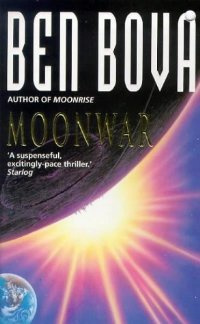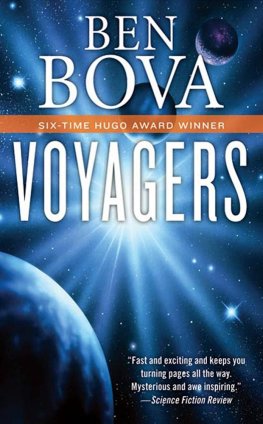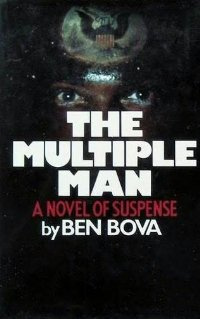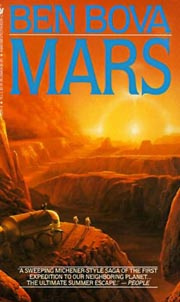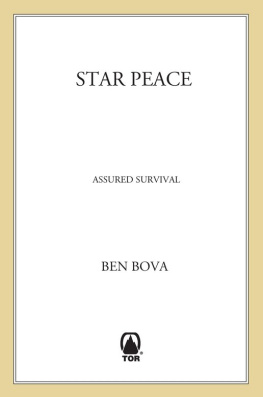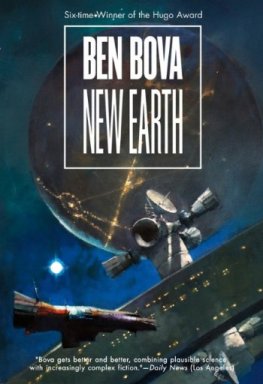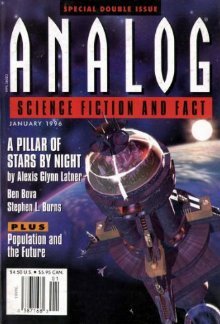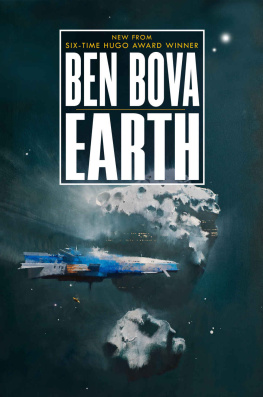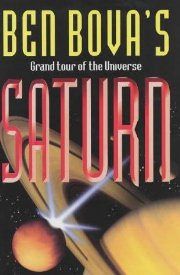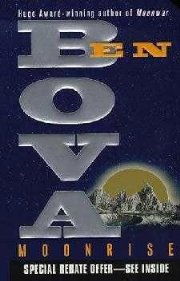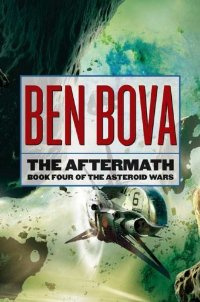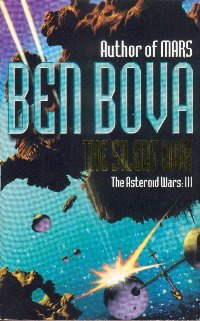Annotation
The sequel to Moonrise.
Douglas Stavenger and his dedicated team of scientists are determined to defend their lifes work, but technology-hating factions on Earth want to close the flourishing space colony, Moonbase. Can a combination of military defence and political wisdom save the colony?
Moonwar
by Ben Bova
War is an evil thing, but to submit to the dictation of other states is worse Freedom, if we hold fast to it, will ultimately restore our losses, but submission will mean permanent loss of all that we value To you who call yourselves men of peace, I say: You are not safe unless you have men of action on your side.
Thucydides
Once we have lived through the rapid changes that are now marking our transition from the third to the fourth phase of history, from a period of diversification to one of unification, we shall be squarely faced with a number of serious problems
It has been shown by many social experiments that man cannot control every facet of life. All we can do is to try to isolate the factors that are the keys to the entire structure, and to work on them. These are basically: the conservation of natural resources; power-production; population-control; the full utilization of brainpower; and education. The details of the social structure will fall into place automatically as the end product of all these forces; as they always have done
Political unification of the world is not the first necessary step. By the time it has become possible without turmoil, it will also have become unnecessary.
Carleton S. Coon
PROLOGUE: MOONBASE CONTROL CENTER
L-1s out.
The chief communications technician looked up sharply from her keyboard. Try the backup.
Already did, said the man at the console beside her. No joy. Every frequencys dead.
The third comm tech, seated at the console on the chiefs other side, tapped one keypad after another. His display screen showed nothing but streaks of meaningless hash.
They did it, he confirmed. They pulled the plug.
The other controllers and technicians left their own stations and drifted tensely, expectantly toward the communications consoles. Their consoles flickered and glowed, untended. The big electronic wall screen that displayed all of Moonbases systems hung above them as if nothing unusual was happening.
The chief pushed back her little wheeled chair slightly. They did it right when they said they would, didnt they?
Thats it, then, said the male comm tech. Were at war.
No one replied. No one knew what to say. The knot of men and women stood there in uneasy silence. The only sounds were the low humming of the electronics consoles and the soft whisper of the air-circulation fans.
Id better pipe the word up to the boss, the chief technician muttered, reaching toward her keyboard. She started to peck at the keys.
Shit! she snapped. I broke a fingernail.
PART I: Skirmish
TOUCHDOWN MINUS 116 HOURS 30 MINUTES
Douglas Stavenger stood at the crest of Wodjohowitcz Pass, listening to the silence. Inside the base there were always voices, human or synthesized, and the constant background hum of electrical machinery. Out here, up on the mountains that ringed the giant crater Alphonsus, he heard nothing but his own breathingand the faint, comforting whir of the spacesuits air circulation fans.
Good noise, he thought, smiling to himself. When that noise stops, so does your breathing.
He had climbed down from the tractor near the spot where the plaque was, a small square of gold riveted onto the rock face, dedicated to his father:
On this spot Paul Stavenger chose to die,
in order to save the men and women of
Moonbase
Doug had not driven up to the pass for the sake of nostalgia, however. He wanted to take a long, hard look at Moonbase. Not the schematic diagrams or electronic charts, but the real thing, the actual base as it stood beneath the uncompromising stars.
Everyone in the base thought they were safe and snug, dug into the side of the ringwall mountain they had named Yeager. Sheltered by solid rock, they had little fear of the dangers up on the airless surface, where the crater floor was bathed in hard radiation and the temperature could swing four hundred degrees between daylight and night, between sunshine and shadow.
But Doug saw how terribly vulnerable they all were. They had protected themselves against the forces of nature, true enough. But now they were threatened with destruction by the hand of war.
Doug looked out at the solar farm, thousands of acres of dark solar cells that greedily drank in sunlight and converted it noiselessly into the electricity the base needed the way a man needs blood. They could be blown to dust by conventional explosives or blasted into uselessness by the radiation pulse from a nuclear warhead.
Even easier, he realized, an enemy could knock out the radiators and wed all stew underground in our own waste heat until we either surrendered or collapsed from heat exhaustion.
His eyes travelled to the rocket pads. They were empty now that the mornings lunar transfer vehicle had loaded up and departed. Beyond, he saw the geodesic dome that sheltered the construction pad; inside it, a half-built Clippership was being built by virus-sized nanomachines that converted meteoric carbon dust into the hard, strong structure of pure diamond. How could we protect spacecraft sitting out on the pads? We cant shelter them and we dont have the facilities to bring them underground. That dome is no protection against missiles or even bullets.
He looked farther out across the crater floor, to where the mass launcher stretched its lean dark metallic finger to the horizon. A single warhead could wreck it forever, Doug knew.
Well, we cant beat them in a shooting war, he told himself. Thats certain.
Turning his gaze back to the edge of the solar farm, Doug saw the dark slick-looking film on the ground where the nanomachines were busily converting the silicon and metals of the lunar regolith into more solar cells.
Thats what this war is all about, he knew. Nanomachines. And he thought he could feel the trillions of nanos inside his own body. If I go back to Earth Ill be a marked man. Some crackpot nanoluddite will murder me, just the way theyve killed so many others. But if the only way to avert this war is to close Moonbase, where else can I go?
His mind churning, he turned again and looked down at the deep pit that would one day be Moonbases grand plaza. If we ever get to finish it.
All construction jobs begin by digging a hole in the ground, he said to himself. It doesnt make any difference if youre on the Moon or the Earth.
Under the brilliant illumination of powerful lamps spaced around the edge of the pit, front-loaders were working soundlessly in the lunar vacuum, scooping up dirt and dumping their loads onto the waiting trucks. Clouds of fine lunar dust hung over the machines, scattering the lamp light like fog. The first time Ive seen mist on the Moon, Doug mused. Not a molecule of water in that haze, though.
All of the machinery was controlled by operators sitting safely inside their stations at the control center. Only a handful of construction workers were actually out on the floor of the crater Alphonsus.
I should be inside, too, Doug told himself. The deadline comes up right about now. I ought to be inside facing the music instead of out here, trying to avoid it all.
In the seven years of his exile on the Moon, Doug had always come out to the lunar surface when he had a problem that ached in him. The Moons harsh, airless other-worldliness concentrated his mind on the essentials: life or death, survival or extinction. He never failed to be thrilled by the stark grandeur of the lunar landscape. But now he felt fear, instead. Fear that Moonbase would be closed, its potential for opening the space frontier forever lost. Fear that he would have to return to Earth, where fanatic assassins awaited him.

